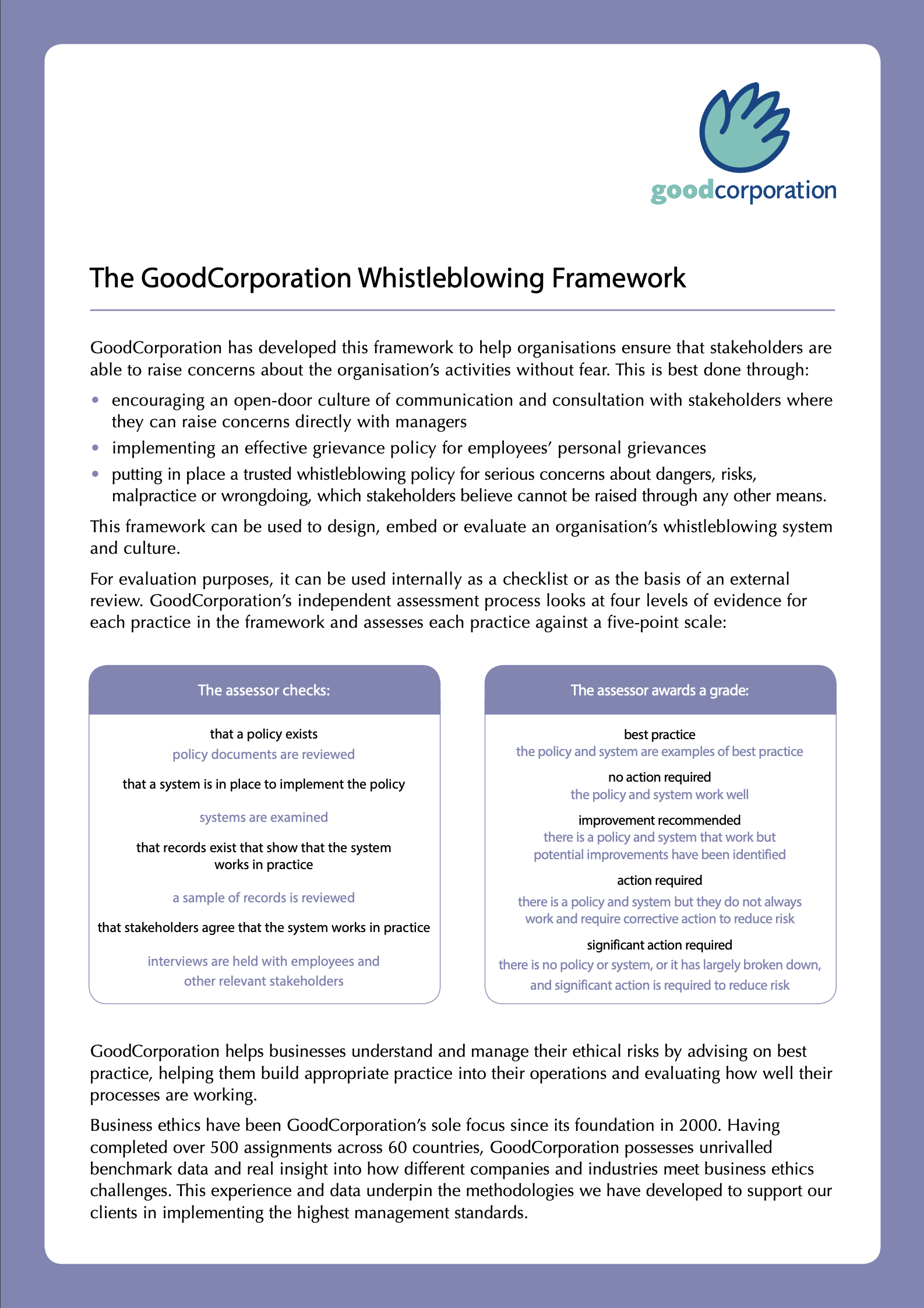Whistleblowing and speak-up
There is a growing recognition that an effective whistleblowing system forms a key component of risk management. Where a good speak-up/listen-up culture exists, it creates an early warning system, allowing problems to be identified and rectified before they escalate into a crisis.
Successful speak-up systems combine effective whistleblowing processes, communications and most importantly trust. This ensures that stakeholders have the confidence to raise concerns through the right channels without fear of futility or reprisal. GoodCorporation helps build and embed those systems.
Our whistleblowing and speak-up services
GoodCorporation works with organisations to establish effective whistleblowing systems by developing tailored policies, processes and communications. This can include:
- Drafting or revising whistleblowing policies
- Evaluating and establishing triage and investigations processes
- Assessing speak-up culture and identifying gaps and opportunities for improvement
- Developing communications strategies to promote speak-up channels and an open-door culture for raising concerns
- Designing training programmes to support stakeholders in how to effectively utilise and manage whistleblowing processes and investigations
- Identifying whistleblowing metrics to support organisations’ ESG and annual reporting
How to embed an effective speak-up culture in your organisation
Communicating and promoting speak-up requires constant work and commitment. Companies that do this well work hard to reinforce speak-up messages in a variety of ways, incorporating these messages into everyday business activities, and treating speak-up communications like any other internal communications campaign. Success also requires the commitment of senior management who should be seen to reinforce speak-up messages on a regular basis.
In our webinar for EQS Group, we discuss how to embed a speak-up system successfully. We examine the type of workplace culture that fosters trust and encourages speak-up.
We also explore best practice for communicating whistleblowing practices and developing the training needed to ensure that staff know how to use the system to raise concerns and that managers know how to respond when concerns are raised.
Making whistleblowing work
Encouraging employees and other stakeholders to report concerns about misconduct and inappropriate behaviour is increasingly regarded as an essential component of effective risk management.
A well-trusted and successfully embedded speak-up system can be one of the most efficient means of identifying risks and rectifying them before they escalate into a crisis. However, making whistleblowing work requires careful planning. This means understanding the culture of the organisation, identifying any barriers to speaking up that may exist and developing clear policies and procedures that will work for the organisation as a whole.
Our blog on 'Making whistleblowing work' explores some of the barriers that prevent people from raising concerns. We also examine the steps organisations should be taking to put in effective systems and processes in order to embed a trusted and appropriately used speak-up system.
Building an effective whistleblowing system
Implementing a speak-up or whistleblowing system is one thing, persuading staff to use it is the key to making it work.
In this podcast, GoodCorporation senior consultant Lisa Randles talks about the key steps organisations need to take in order to embed a speak-up system effectively
Lisa explores what it takes to build a workplace culture based on trust and ethical conduct. The podcast also examines the importance of good communication in raising awareness of a whistleblowing hotline, the role of senior management in promoting the system and the need for training, training and more training.
Frequently asked questions about whistleblowing and speak-up
Most employees do not leak information because they want to but because valuable insights are ignored. By contrast, companies where people can speak up are organisations where every employee is an early warning system, where improvement and change are normal.
Margaret Heffernan
Entrepreneur and author, in the Financial Times, 18 February 2021
Explore our frameworks
Browse our frameworks and request your copy




